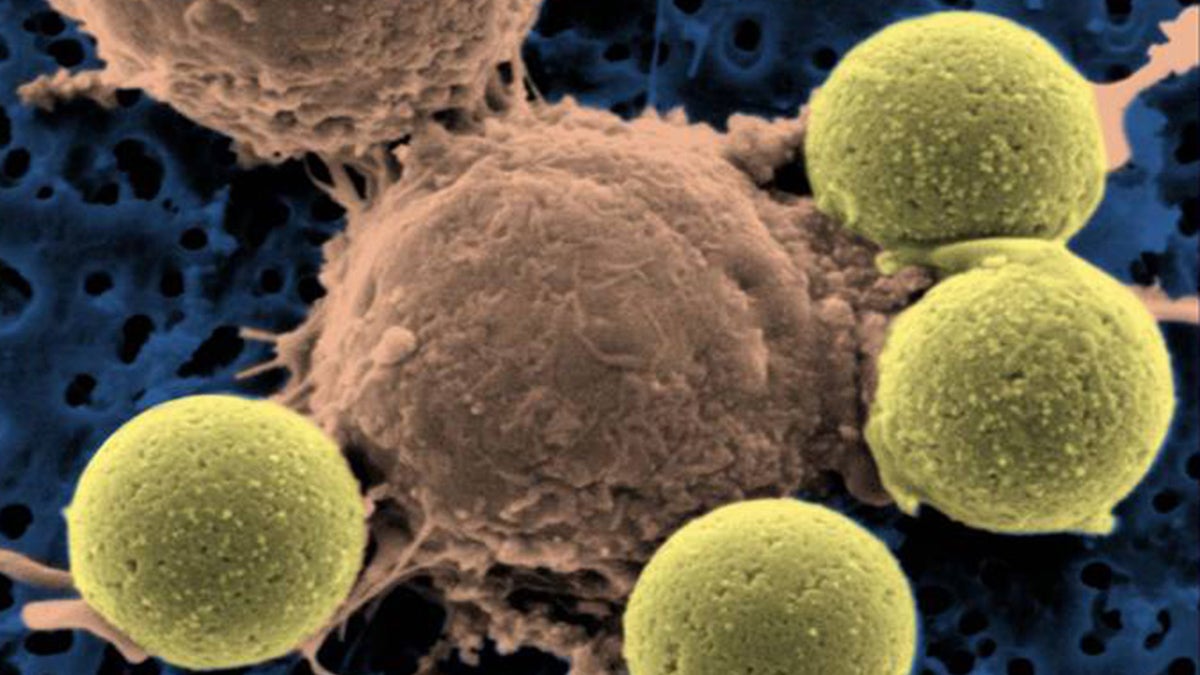Patent settlement clears way for continuing Penn, St. Jude cancer research

This microscopy image provided by Dr. Carl June on Wednesday, Aug. 10, 2011 shows immune system T-cells, center, binding to beads which cause the cells to divide (Dr. Carl June/AP Photo)
In the past few years, researchers at the University of Pennsylvania have made huge strides in developing a form of cancer immunotherapy — using the body’s own T cells to fight certain types of tumors associated with leukemia.
But in the shadows of those discoveries lurked a pending lawsuit over the use of certain methods associated with similar research at St. Jude Children’s Research Center in Tennessee.
This week, that lawsuit was put to rest.
“That’s the best thing they could have possibly done,” said Brenda Gavin, a biotech venture capitalist at Quaker Partners in Philadelphia.
“From a business perspective, it’s the right thing to do,” Gavin added. “But, even more importantly, from a science perspective, it’s not very productive to have people’s time taken being deposed and essentially fighting a lawsuit.”
St. Jude’s brought the lawsuit against Penn in 2012 over what it cited as a breached agreement related to the use of a molecular receptor in immunotherapy that St. Jude’s had developed, and lead Penn researcher Dr. Carl June had used freely in his cancer treatment development.
Novartis paired with Penn in August 2012, and Juno Therapeutics partnered with St. Jude in December 2013.
Gavin’s been involved in cases like this before that have gone all the way to trial. It’s expensive and incredibly stressful, she said, and even in the end, it’s impossible to know how it’ll turn out.
In this case, Novartis, the biotech firm that funds Penn’s cancer research, will pay St. Jude’s backer, Juno Therapeutics, $12.25 million up front and then a small percentage of royalties on future treatment profits.
“We are pleased by this settlement,” said Juno CEO Hans Bishop in a press release. “It benefits patients by allowing each party to advance promising cancer immunotherapies and rewards the investigators on whose insights those developments are based.”
“Our collaboration with Penn was formed to bring important new therapies to patients who are in desperate need of new treatment options,” said Novartis spokeswoman Elizabeth Powers in an email. “We are proud to be working with Carl June and the renowned researchers at Penn.”
Now that the lawsuit is settled, Gavin said, the two powerhouses in cancer research can proceed aggressively. She doubts there will be much animosity between the two sides going forward.
“Let me just put it this way, they don’t have to cooperate with each other,” said Gavin. “They can each do their own research, and it can be slightly different, and not infringe on either one. I don’t see it as an impedance at all.”
Since the lawsuit was filed in 2012, the research never really halted anyway. In July, the T-cell treatment developed by Penn was designated a “breakthrough therapy” by the Food and Drug Administration.
WHYY is your source for fact-based, in-depth journalism and information. As a nonprofit organization, we rely on financial support from readers like you. Please give today.

